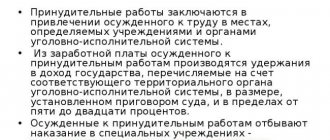When committing a criminal or administratively punishable act, a citizen may receive punishment in the form of compulsory, corrective or forced labor.
In a number of cases, the court replaces the performance of work with imprisonment. What should a convicted person do under such circumstances?
How to avoid ending up in correctional colonies by doing work as a punishment? Let's try to figure it out.
What is mandatory work?
Compulsory work is provided for in Article 49 of the Criminal Code of the Russian Federation. They include any form of community service that the offender carries out free of charge.
So, the required work:
- They are free of charge;
- Income from compulsory work goes to the state budget;
- Carried out in free time from main work;
- They cannot be assigned as an additional punishment, since they are only the main type of punishment;
- They cannot be replaced by a fine or other payments in favor of the state, according to the Criminal and Criminal Procedure Code of the Russian Federation.
Compulsory labor is established by local government bodies (LSG) in accordance with the instructions of the penal inspection and is the main type of punishment.
What crimes are punishable by compulsory labor?
Compulsory labor is nothing more than a criminal punishment for committing crimes provided for by the Criminal Code of the Russian Federation.
Compulsory labor is included in the list of main types of criminal punishment for crimes of minor gravity.
A person who has committed one of the following crimes may be punished with compulsory labor:
- Theft;
- Petty robberies without causing harm to the victim’s health;
- Crimes against the property of another person;
- Crimes against commercial and other organizations in which the convicted person works;
- Vandalism;
- Desecration of state symbols;
- Evasion of payment of alimony;
- Other minor crimes.
Compulsory labor cannot be imposed simultaneously with other types of punishment or replaced with a fine and property confiscation.
Differences between compulsory and forced labor
Art. 53 of the Criminal Code of the Russian Federation provides for another type of criminal punishment - forced labor . The main differences from forced labor are presented as follows:
- Compulsory work is not paid, forced work is paid;
- Compulsory labor will have to be served in the convict’s area of residence, while forced labor may be carried out far from the place of permanent residence;
- In forced labor, a certain amount is deducted from the convict's wages;
- Forced labor can be applied for crimes of moderate gravity or serious crimes committed for the first time, compulsory labor - only for minor crimes;
- Forced labor is prescribed from 2 months to 5 years;
- Forced labor is not applied to convicted minors; compulsory labor can be applied from the age of 14.
In essence, forced labor is an alternative to imprisonment. That is, this is an objectively harsher punishment compared to the use of compulsory labor.
Types of compulsory work
As we said just above, the type of mandatory work or object for improvement is determined by local government bodies and the criminal-executive inspection. The choice of type of mandatory work is influenced by:
- Age of the culprit;
- His gender;
- Health status;
- Work ability;
- Employment at the main job.
If the culprit is a disabled person (disabled person of group 1 or 2), then compulsory work must be replaced by another type of punishment.
Here are the most common types of mandatory work:
- Cleaning streets and parks;
- Deforestation;
- Construction of public buildings;
- Cargo transportation;
- Landscaping;
- Improvement of urban areas;
- Performing auxiliary work in hospitals, etc.;
- Care for sick and elderly citizens receiving government support or treatment in hospitals;
- Other socially useful works.
Compulsory work does not require the convicted person to have special knowledge, qualifications, or possession of special skills or tools. It can be assigned only during free time from main work or study. The convicted person cannot refuse to perform it; for failure to show up for work, he will incur compulsory sanctions from the penitentiary inspection.
Who can be sentenced to perform compulsory work?
Such punishment is provided for in a large number of articles of the Criminal Code of the Russian Federation. The following examples of offenses can be given:
- Battery – Article 116 of the Criminal Code of the Russian Federation.
- Violation of inventive and patent rights – Article 147 of the Criminal Code of the Russian Federation.
- Obstruction of the work of journalists - Art. 144 of the Criminal Code of the Russian Federation.
- Disclosure of the secret of adoption - Article 155 of the Criminal Code of the Russian Federation;
- Obstruction of the legal activities of an entrepreneur - 169 of the Criminal Code of the Russian Federation;
- Hooliganism – Art. 213 of the Criminal Code of the Russian Federation;
- Vandalism - Art. 214 of the Criminal Code of the Russian Federation, etc.
As you can see, this type of punishment is found in almost all chapters of the criminal code.
At the same time, the following categories of convicts cannot be sentenced to compulsory labor:
- Disabled people of the first group.
- Pregnant women and mothers with children under three years of age.
- Military personnel who are undergoing military service or under contract.
How long does community service last?
The main question that comes first to the mind of a convicted person is how long does community service last?
The term of execution of the sentence - community service - ranges from 60 to 480 hours, approximately 4 hours on a day off, no more. On weekdays, compulsory work is only 2 hours - Article 49 part 2 of the Criminal Code of the Russian Federation.
In other words, if you roughly calculate the time of community service per week, it will be approximately 12-18 hours. The minimum threshold is 12 hours per week. It is impossible to assign less than this period.
However, if the convicted person has valid reasons (family problems or serious illnesses), then by decision of the penal inspection the number of weekly hours can be reduced. But the total number of hours that must be worked cannot be reduced.
Juvenile offenders are identified as a separate category. Due to their age and the need for training, their sentence in the form of community service is lower than that of adult citizens. It ranges from 40 to 160 hours.
Compulsory work for a teenager is assigned only in the form of activities feasible for him, in his free time from school, and their duration should not exceed 160 hours.
In addition, working hours per day are also limited by the age of the convicted person:
- Persons from 14 to 15 years old work no more than 2 hours a day;
- Persons from 15 to 16 years old – no more than 3 hours a day.
In case of malicious evasion from performing compulsory labor, convicts can be deprived of their liberty and serve their sentence in specially equipped places - prisons. The period of compulsory labor can be assigned or changed only by a court.
Have a question for a lawyer? Ask now, call and get a free consultation from leading lawyers in your city. We will answer your questions quickly and try to help with your specific case.
Telephone in Moscow and the Moscow region: +7
Phone in St. Petersburg and Leningrad region: +7
Free hotline throughout Russia: 8 (800) 301-39-20
Mandatory work: concept and features
Compulsory work is a type of criminal punishment that requires the convicted person to perform community service in his free time.
That is, this measure of liability can only be applied to those who have their main place of work or study.
Mandatory work is regulated by Art. 49 of the Criminal Code of the Russian Federation, as well as Art. 3.13 Code of Administrative Offenses of the Russian Federation. Since 2013, compulsory labor has appeared as a type of administrative punishment in the Code of Administrative Offenses of the Russian Federation.
For serving compulsory labor, convicts do not receive any material reward.
This type of punishment is assigned, as a rule, for crimes of minor gravity. Labor assignments within the framework of compulsory work do not require special knowledge and skills from convicts or a certain degree of labor qualification.
Key Features
The features that distinguish compulsory labor from other types of criminal punishment are:
- Application only to officially employed persons or students;
- The works are aimed at obtaining public benefit;
- Does not involve remuneration, all income is sent to the state budget;
- It is not expected to select the location for mandatory work;
- Are of a coercive nature;
- They are not a final form of punishment; they are easily replaced by a real term of imprisonment in case of violations of service.
Compulsory work involves a moral impact on the convicted person. For minor offenses, convicts are forced to engage in unskilled and low-prestige work, moreover, in the area where they live.
Who is assigned and who is not assigned mandatory work?
Compulsory labor is a type of basic criminal punishment.
Compulsory labor may be imposed for the following criminal acts:
- Theft;
- Non-payment of alimony;
- Crimes against other people's property;
- Vandalism;
- Harm to the environment;
- Evasion of paying fines, etc.
In Art. 49 of the Criminal Code of the Russian Federation prescribes restrictions on the circle of persons against whom this punishment cannot be applied.
So, compulsory work cannot be served by:
- Disabled people of the first group;
- Pregnant women;
- Woman with children under 3 years old;
- Contract military personnel of privates and sergeants who have not served their term of service at the time of sentencing.
Other types of criminal liability apply to these categories of citizens.
Types of compulsory work
As a rule, measures to improve the surrounding area are used as mandatory work. Every healthy person can do this kind of work without any special skills. Where the sentence can be served will be decided by the penitentiary inspectorate.
The types of compulsory labor and the places where they are served are determined jointly by local government authorities and representatives of the penal inspection.
The following may be required as required work:
- Street cleaning;
- Repair work of entrances and courtyards;
- City greening, etc.
The choice of a specific type of work is selected based on the age and health of the convicted person. You can serve work in both public and private institutions.
Time served for compulsory work
The minimum number of hours for serving a sentence by court decision is set at 60 hours, and the maximum at 480 hours.
According to Art. 49 of the Criminal Code of the Russian Federation, compulsory work is served no more than 4 hours a day.
During vacations and vacations, the time for serving compulsory work does not change in any way.
For minors who have violated the law, other procedures for the execution of punishment are provided. The boundaries of time intervals for them are set at 40-160 hours.
Peculiarities of execution of punishment depending on age:
- 14-15 years old – no more than 2 hours a day;
- 15-16 years old – no more than 3 hours a day;
- 16-18 years old – no more than 4 hours a day.
Established standards for serving a sentence may be reduced in agreement with employees of the penal inspection if there are good reasons for this.
Who is not assigned compulsory work?
Despite the fact that compulsory work, as a rule, is not a heavy activity, the law has provided a list of persons who cannot be forced to perform it.
So, compulsory work cannot be assigned to the following persons:
- Disabled citizens, disabled people of group 1;
- Pregnant women or mothers of children under 3 years of age;
- Military personnel currently undergoing military service under conscription or contract.
As we can see, compulsory work is not assigned to disabled persons who are forced to provide care for other people, serve the state, or have serious illnesses or other health problems.
Who is given this kind of punishment?
Compulsory labor is assigned as the main punishment to persons who have committed the following offenses:
- deviation from arrest, payment of fines;
- harm to the environment;
- failure to maintain order when participating in public events;
- violations during crowds of people;
- blocking the movement of personal and public transport.
An important condition for awarding such a punishment is damage to the health or property of third parties. This preventive measure cannot be used against the following citizens:
- disabled people;
- unemployed;
- pregnant women;
- mothers of children under three years of age.
Representatives of some professions are also not assigned compulsory work. Among them are military personnel, police and fire officials, representatives of the executive system of government and others.
How is the punishment carried out?
Mandatory community service is the same criminal punishment as imprisonment. Therefore, the convicted person can neither evade it nor refuse to carry it out if he does not want to worsen his situation and receive a real term of imprisonment.
The execution of public works is monitored by the criminal-executive inspection, which oversees the convicted person. As a rule, it is located at his place of residence.
Execution of punishment begins from the moment a copy of the court verdict or decision to involve the convicted person in compulsory labor is submitted to the inspectorate. The document must be submitted within 15 days.
The main functions performed by the criminal-executive inspection after receiving a court verdict:
- Maintaining records of convicted persons sentenced to perform community service;
- Explaining and conducting special conversations with convicts on the procedure and execution of punishment;
- Determining the list of objects and places of work to which a convicted person can be sent. Conducted jointly with local governments;
- Monitoring the execution of punishment by convicts and their working time;
- Recording the hours worked by the convicted person and maintaining general records.
Additional control over the execution of punishment is carried out by the administration of the organization where public compulsory labor is carried out: recording time worked, completing all tasks given to the convict, notifying the inspectorate about the completion of “working out”. Also, if a convicted person evades compulsory work, the administration is obliged to immediately notify the employees of the penal inspection.
In turn, the convicted person is obliged to follow all instructions given to him, as well as:
- Comply with the internal regulations of the institution in which he is undergoing mandatory work;
- Carry out all instructions conscientiously and not provoke conflicts and scandals at work;
- Arrive at work on time and work all legally required hours of work;
- Promptly notify the criminal-executive inspection on the following issues:
- About change of permanent residence;
- On the need to care for young children;
- About serious illness and treatment in hospitals.
Despite the categorical rules for the execution of punishment, it is possible to cancel compulsory work upon a petition for exemption from it submitted to the court. The following convicts can apply:
- Recognized as disabled group 1;
- If a serious illness occurs in which the convicted person is unable to work;
- When pregnancy occurs in women and the planned birth of a child and further care for him until his 3rd birthday.
Leave received from the main place of work of the convicted person cannot suspend the execution of the sentence and release him from compulsory work during the rest period.
Malicious evasion of compulsory work
Evasion from execution of punishment entails new criminal liability. To find a convicted person guilty of evading compulsory work, the following reasons must be present:
- Absence of a convicted person from a place of performing compulsory labor without good reason at least twice within 30 days;
- In case of violation of labor discipline, at least twice during a month of compulsory work;
- A convict who decides to hide from the law in order to avoid compulsory labor and other litigation related to the execution of punishment.
If the convicted person does not appear at the inspection to clarify the reasons for his failure to appear for compulsory work, he will be put on the wanted list and may be detained at the Ministry of Internal Affairs department for up to 48 hours (two days). By decision of the court, this period may be increased by a court decision to 30 days.
Please note that Russian legislation is constantly changing and the information we write may become outdated. In order to resolve the issue you have regarding Criminal Law, we advise you to seek the advice of a lawyer in support of the site.
Responsibility for evasion
If a convicted person evades serving a sentence without compelling reasons (illness, death of a loved one, force majeure circumstances), he faces increased punishment.
A convicted person is considered to be avoiding work if he:
- I didn’t go to work more than 2 times in a month.
- Violated labor discipline more than 2 times in a month.
- Hiding from representatives of the criminal-executive inspection.
In the latter situation, the convicted person is put on the wanted list. After arrest, he is placed in a cell for 2 days (the period can be extended to one month).
Subsequently, the convicted person is given a replacement sentence for:
- forced labor (at the rate of 1 day of forced labor equal to 8 hours of compulsory labor);
- imprisonment (at the rate of 1 day of forced labor equal to 8 hours of compulsory labor)
We will talk about forced labor as a separate type of punishment in a separate article https://lexconsult.online/8968-prinuditelnye-raboty-ponyatie-i-usloviya








